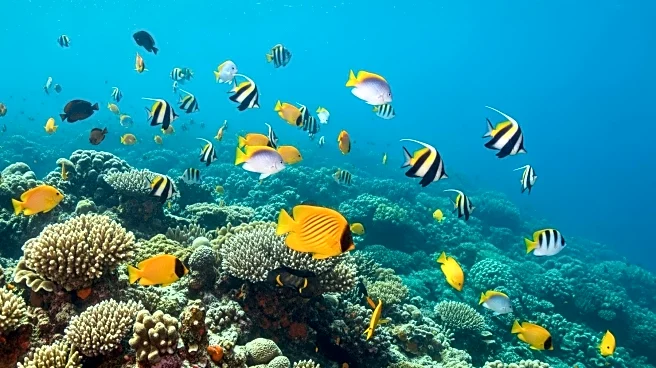What's Happening?
The World Trade Organization (WTO) has implemented the first part of the Agreement on Fisheries Subsidies, targeting environmentally damaging and unsustainable fishing practices. This agreement, now legally binding for two-thirds of WTO member countries, aims to reduce harmful subsidies that contribute to overfishing and deplete fish populations. Experts highlight the significance of this agreement in allowing fish populations to recover and paving the way for future multilateral treaties focused on environmental protection. The agreement also supports the UN's Sustainable Development Goals, specifically Goal 14, which seeks to end harmful fisheries subsidies. However, further negotiations are needed to finalize additional rules that address subsidies contributing to overcapacity and overfishing.
Why It's Important?
The implementation of the WTO agreement is crucial for global fisheries, as it addresses the issue of subsidy-driven overfishing that threatens marine biodiversity and the livelihoods of coastal communities. By curbing harmful subsidies, the agreement aims to protect food security and economic resilience for vulnerable populations dependent on healthy oceans. The agreement also sets a precedent for future environmental treaties, encouraging countries to adopt sustainable practices and improve transparency in subsidy programs. This development is particularly significant for regions like Latin America, where economies are closely tied to marine resources, offering an opportunity for better ocean governance and responsible management.
What's Next?
Countries must now focus on implementing the agreement by limiting harmful subsidies and providing transparency in their subsidy programs. The WTO members are also negotiating a second set of rules, known as Fish 2, to further address subsidies contributing to overcapacity and overfishing. These negotiations have faced delays, but the upcoming WTO Ministerial Conference could inject fresh momentum into the talks. Strong leadership from major economies and coalitions will be essential to advance these negotiations and achieve meaningful reform. Additionally, the newly launched Fish Fund will support developing countries in monitoring and compliance efforts.
Beyond the Headlines
The agreement's entry into force marks a significant step towards better ocean governance, offering countries a chance to redirect financial resources towards sustainable fishing practices. It also highlights the importance of multi-stakeholder engagement, involving governments, civil society, and scientific communities in implementing the new regulatory framework. For China, the agreement enhances transparency in its fisheries subsidy policies, aligning with recent reforms aimed at sustainable fishing practices. The global community is encouraged to clarify outstanding issues related to harmful subsidies, ensuring equitable support for small-scale fishers and promoting responsible fishing.









